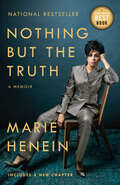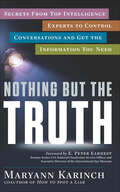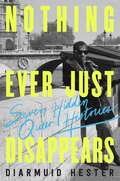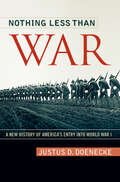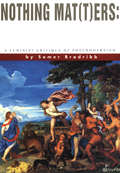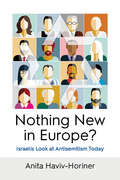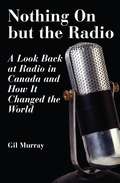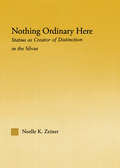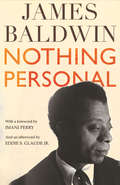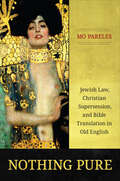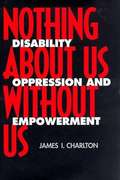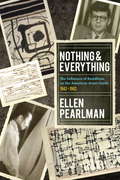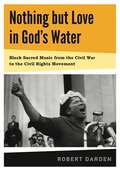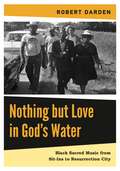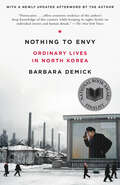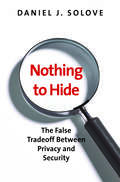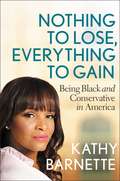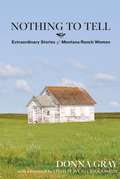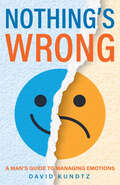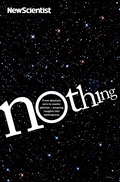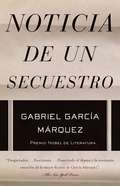- Table View
- List View
Nothing But the Truth: A Memoir
by Marie HeneinAn intimate and no-holds-barred memoir by Canada's top defence lawyer, Nothing But the Truth weaves Marie Henein's personal story with her strongly held views on society's most pressing issues, legal and otherwise.With Nothing But the Truth, Marie Henein, arguably the most sought-after lawyer in the country, has written a memoir that is at once raw, beautiful, and altogether unforgettable. Her story, as an immigrant from a tightknit Egyptian-Lebanese family, demonstrates the value of strong role models--from her mother and grandmother, to her brilliant uncle Sami who died of AIDS. She learned the value of hard work, being true to herself and others, and unapologetically owning it all.Marie Henein shares here her unvarnished view on the ethical and practical implications of being a criminal lawyer, and how the job is misunderstood and even demonized. Ironically, her most successful cases made her a "lightning rod" in some circles, confirming her belief that much of the public's understanding of the justice system is based on popular culture, and social media, and decidedly not the rule of law. As she turns 50 and struggles with the corrosive effect on women of becoming invisible, Marie doubles down on being even more highly visible and opinionated as she deconstructs, among other things, the otherness of the immigrant experience (Where are you really from?), the pros and cons of being a household name in this country, opening her own boutique law firm, and the likes of Martha Stewart and her commoditization of previously unpaid female labour. Nothing But the Truth is refreshingly unconstrained and surprising--a woman at the top of her game in a male-dominated world.
Nothing But the Truth: Secrets from Top Intelligence Experts to Control Conversations and Get the Information You Need
by Maryann Karinch“Shocking, real-life spy secrets . . . Dangerously powerful psychological and emotional levers that instantly allow the reader to build and leverage trust.” —Janine Driver, body-language contributor to NBC’s Today Show and New York Times–bestselling authorTo get the truth from someone, you need two sets of skills. The first are the interpersonal skills necessary to get the facts. But the second group of skills is equally if not more important: they enable you to assess whether the facts actually fit together—whether they are true—and identify the emotions that shaped them.In Nothing but the Truth, top intelligence experts from the worlds of espionage, business, and law enforcement reveal how they get the information they need and give you the key tools to get the information you need, including:A system to vet sourcesEight conversation motivators that help you drive toward the truthTechniques to turn a hostile source into a cooperative oneThe means to control the sequence of a conversationGetting the truth through email or on the phoneWhether your aim is to grill suspects and witnesses, help someone with an urgent need, figure out who is lying or cheating, or upgrade your ability to be honest with yourself, Nothing but the Truth will show you how to do it.“Karinch has amassed an extraordinary compilation of analysis and practical advice by top experts in the field. There is nothing on the book market quite like it. It will change the way you look at yourself and other people. You will find it to be a fun and highly valuable read.” —Jack Devine, author of Good Hunting, former head of CIA
Nothing Ever Just Disappears: Seven Hidden Queer Histories
by Diarmuid HesterAn exploration of artistic freedom, survival, and the hidden places of the imagination, including James Baldwin in Provence, Josephine Baker in Paris, Kevin Killian in San Francisco, and E. M. Forster in Cambridge, among other groundbreaking queer artists of the twentieth century.Nothing Ever Just Disappears is radical new history of seven queer lives and the places that shaped these groundbreaking artists. At the turn of the century, in the shade of Cambridge's cloisters, a young E. M. Forster conceals his passion for other men, even as he daydreams about the sun-warmed bodies of ancient Greece. Under the dazzling lights of interwar Paris, Josephine Baker dances her way to fame and fortune and discovers sexual freedom backstage at the Folies Bergère. And on Jersey Island, in the darkest days of Nazi occupation, the transgressive surrealist Claude Cahun mounts an extraordinary resistance to save the island she loves, scattering hundreds of dissident artworks along its streets and shorelines. Nothing Ever Just Disappears brings to life the stories of seven remarkable figures and illuminates the connections between where they lived, who they loved, and the art they created. It shows that a queer sense of place is central to the history of the twentieth century and powerfully evokes how much is lost when queer spaces are forgotten. From the suffragettes in London and James Baldwin's home in Provence, to Kevin Killian's San Francisco and Derek Jarman&’s cottage in Kent, this is both a thrilling new literary history and a celebration of freedom, survival, and the hidden places of the imagination.
Nothing Has to Make Sense: Upholding White Supremacy through Anti-Muslim Racism (Muslim International)
by Sherene H. RazackHow Western nations have consolidated their whiteness through the figure of the Muslim in the post-9/11 world While much has been written about post-9/11 anti-Muslim racism (often termed Islamophobia), insufficient attention has been given to how anti-Muslim racism operates through law and is a vital part of law&’s protection of whiteness. This book fills this gap while also providing a unique new global perspective on white supremacy. Sherene H. Razack, a leading critical race and feminist scholar, takes an innovative approach by situating law within media discourses and historical and contemporary realities. We may think of law as logical, but, argues Razack, its logic breaks down when the subject is Muslim. Tracing how white subjects and majority-white nations in the post-9/11 era have consolidated their whiteness through the figure of the Muslim, Razack examines four sites of anti-Muslim racism: efforts by American evangelical Christians to ban Islam in the school curriculum; Canadian and European bans on Muslim women&’s clothing; racial science and the sentencing of Muslims as terrorists; and American national memory of the torture of Muslims during wars and occupations. Arguing that nothing has to make sense when the subject is Muslim, she maintains that these legal and cultural sites reveal the dread, phobia, hysteria, and desire that mark the encounter between Muslims and the West. Through the prism of racism, Nothing Has to Make Sense argues that the figure of the Muslim reveals a world divided between the deserving and the disposable, where people of European origin are the former and all others are confined in various ways to regimes of disposability. Emerging from critical race theory, and bridging with Islamophobia/critical religious studies, it demonstrates that anti-Muslim racism is a revelatory window into the operation of white supremacy as a global force.
Nothing Less Than War: A New History of America's Entry into World War I (Studies In Conflict, Diplomacy And Peace Ser.)
by Justus D. Doenecke“An equally meticulous and lucid account” of the controversy that preceded the United States’ declaration of war in April 1917 (Historynet).When war broke out in Europe in 1914, political leaders in the United States were swayed by popular opinion to remain neutral; yet less than three years later, the nation declared war on Germany. In Nothing Less Than War: A New History of America’s Entry into World War I, Justus D. Doenecke examines the clash of opinions over the war during this transformative period and offers a fresh perspective on America’s decision to enter World War I.Praise for Nothing Less Than War“Nothing Less Than War combines careful attention to diplomacy with an excellent consideration of politics and public opinion. It is superb in detail, and even scholars well versed in the field will learn things they didn’t know before.” —John Milton Cooper Jr., author of Woodrow Wilson: A Biography“Nothing Less Than War is a thoughtful look at America’s entry into World War I. Based on impressive research, it carries the reader back to a very different time, reassesses the wide-ranging debate over the war in Europe, and provides a stimulating re-examination of the strengths and weaknesses of Woodrow Wilson’s leadership.”?Charles Neu“Doenecke paints intriguing portraits of leading figures, many now obscure, including Franklin Delano and Theodore Roosevelt and William Jennings Bryan, plus the rich stew of newspapers, magazines, organizations, diplomats, and propagandists who fought over this issue.” —Publisher Weekly (starred review)“Doenecke untangles and clarifies the national debate in great detail in this dense, well-documented study. It will be of great use to serious students and researchers of the Great War.” —Library Journal
Nothing Mat(t)ers: A Feminist Critique of Postmodernism
by Somer BrodribbLévi-Strauss tried to convince women that we are spoken, exchanged like words; Lacan tried to teach women we can't speak, because the phallus is the original signifier; and then Derrida says that it doesn't matter, it's just talk.Foucault, Derrida, Lacan, Nietzsche: the chant resonates through universities around the world. Have you ever tried to untangle the words of postmodernist theorists? How to find your way through the labyrinth to sense and clarity? If so, this is the book for you.
Nothing New in Europe?: Israelis Look at Antisemitism Today
by Anita Haviv-HorinerToday, more than 75 years after the Holocaust and World War II, antisemitism remains a poisonous force in European culture and politics, whether cloaked in the garb of reactionary nationalism or manifested in outright physical violence. Nothing New in Europe? provides a sobering look at the persistence of European antisemitism today through fifteen interviews with Jewish Israelis living in Germany, Poland, France, and other countries, supplemented with in-depth scholarly essays. The interviewees draw upon their lived experiences to reflect on anti-Jewish rhetoric, the role of Israel, and the relationship between antisemitism and the persecution of other minorities.
Nothing On But the Radio: A Look Back at Radio in Canada and How It Changed the World
by Gil MurrayRadio made its debut in the early twentieth century, and the world was never the same. The mysterious magic box brought people together as no other communication medium had ever done. In Nothing On but the Radio, author Gil Murray tells how the new household toy put voices and music into millions of homes. In the 1920s, families gathered around the crystal set; in the 1930s, radio comedians helped offset the Depression; in the wartime 1940s, radio kept up morale; in the 1950s and 1960s, its music, news, and information spread knowledge and entertainment. This book spotlights a popular revolution that was never quiet.
Nothing Ordinary Here: Statius as Creator of Distinction in the Silvae (Studies In Classics Ser. #11)
by Noelle K. ZeinerThrough a combined methodology of philology, social theory and archaeology this book offers a reinterpretation of Statius's Silvae.
Nothing Personal
by James BaldwinJames Baldwin&’s critique of American society at the height of the civil rights movement brings his prescient thoughts on social isolation, race, and police brutality to a new generation of readers.Available for the first time in a stand-alone edition, Nothing Personal is Baldwin&’s deep probe into the American condition. Considering the Black Lives Matter protests in the summer of 2020 – which were met with tear gas and rubber bullets the same year white supremacists entered the US Capitol with little resistance, openly toting flags of the Confederacy – Baldwin&’s documentation of his own troubled times cuts to the core of where we find ourselves today. Baldwin&’s thoughts move through an interconnected range of questions, from America&’s fixation on eternal youth, to its refusal to recognize the past, its addiction to consumerism, and the lovelessness that fuels it in its cities and popular culture. He recounts his own encounter with police in a scene disturbingly similar to those we see today documented with ever increasing immediacy. This edition also includes a new foreword from interdisciplinary scholar Imani Perry and an afterword from noted Baldwin scholar Eddie S. Glaude Jr. Both explore and situate the essay within the broader context of Baldwin&’s work, the Movement for Black Lives, the COVID-19 pandemic, and the presidency of Donald Trump. Nothing Personal is both a eulogy and a declaration of will. In bringing this work into the twenty-first century, readers new and old will take away fundamental and recurring truths about life in the US. It is both a call to action, and an appeal to love and to life.
Nothing Pure: Jewish Law, Christian Supersession, and Bible Translation in Old English
by Mo ParelesEarly English culture depended on a Judaism translated away from Jews. Revealing the importance of Jewish law to the workings of early Christian England, Nothing Pure presents a Jewish revision of the history of English Bible translation. The book illuminates the paradoxical process by which the abjection and dehumanization of Jews, a bitter milestone in the history of European racism, was first articulated in the cultural translation of Jewish literature. It locates Old English Bible translation within the history of cultural translation, so that instead of appearing as the romantically liberated fragments of a suppressed mode of literacy, these authorized and semi-authorized vernacular works can be seen as privileged texts appropriating a Jewish source culture into an English Christian host culture. Mo Pareles proposes a theory of translation called supersessionary translation to explain the aesthetics of these texts: while at first glance they appear to dismiss irrelevant Jewish laws according to an arbitrary pattern, closer analysis reveals that they are masterful attempts to subject the legacy of Judaism, through translation, to the control of a system that has purportedly superseded and replaced it. Ultimately, Nothing Pure demonstrates the surprisingly central role of Jewish law in translation to Christian identity in late Old English ecclesiastical and monastic writings.
Nothing about Us, without Us: Disability Oppression and Empowerment
by James I. CharltonNothing About Us Without Us expresses the conviction of people with disabilities that they know what is best for them. Charlton's combination of personal involvement and theoretical awareness assures greater understanding of the disability rights movement. Includes bibliographical references and index.
Nothing and Everything - The Influence of Buddhism on the American Avant Garde
by Ellen PearlmanIn America in the late 1950s and early 60s, the world--and life itself--became a legitimate artist's tool, aligning with Zen Buddhism's emphasis on "enlightenment at any moment" and living in the now. Simultaneously and independently, parallel movements were occurring in Japan, as artists there, too, strove to break down artistic boundaries. Nothing and Everything brings these heady times into focus. Author Ellen Pearlman meticulously traces the spread of Buddhist ideas into the art world through the classes of legendary scholar D. T. Suzuki as well as those of his most famous student, composer and teacher John Cage, from whose teachings sprouted the art movement Fluxus and the "happenings" of the 1960s. Pearlman details the interaction of these American artists with the Japanese Hi Red Center and the multi-installation group Gutai. Back in New York, abstract-expressionist artists founded The Club, which held lectures on Zen and featured Japan's first abstract painter, Saburo Hasegawa. And in the literary world, Jack Kerouac and Allen Ginsburg were using Buddhism in their search for new forms and visions of their own. These multiple journeys led to startling breakthroughs in artistic and literary style--and influenced an entire generation. Filled with rare photographs and groundbreaking primary source material, Nothing and Everything is the definitive history of this pivotal time for the American arts.About the Imprint: EVOLVER EDITIONS promotes a new counterculture that recognizes humanity's visionary potential and takes tangible, pragmatic steps to realize it. EVOLVER EDITIONS explores the dynamics of personal, collective, and global change from a wide range of perspectives. EVOLVER EDITIONS is an imprint of North Atlantic Books and is produced in collaboration with Evolver, LLC.From the Trade Paperback edition.
Nothing but Love in God's Water: Volume 1: Black Sacred Music from the Civil War to the Civil Rights Movement
by Robert DardenThe first of two volumes chronicling the history and role of music in the African American experience, Nothing but Love in God’s Water explores how songs and singers helped African Americans challenge and overcome slavery, subjugation, and suppression. From the spirituals of southern fields and the ringing chords of black gospel to the protest songs that changed the landscape of labor and the cadences sung before dogs and water cannons in Birmingham, sacred song has stood center stage in the African American drama. Myriad interviews, one-of-a-kind sources, and rare or lost recordings are used to examine this enormously persuasive facet of the movement. Nothing but Love in God’s Water explains the historical significance of song and helps us understand how music enabled the civil rights movement to challenge the most powerful nation on the planet.
Nothing but Love in God's Water: Volume 1: Black Sacred Music from the Civil War to the Civil Rights Movement
by Robert DardenThe first of two volumes chronicling the history and role of music in the African American experience, Nothing but Love in God’s Water explores how songs and singers helped African Americans challenge and overcome slavery, subjugation, and suppression. From the spirituals of southern fields and the ringing chords of black gospel to the protest songs that changed the landscape of labor and the cadences sung before dogs and water cannons in Birmingham, sacred song has stood center stage in the African American drama. Myriad interviews, one-of-a-kind sources, and rare or lost recordings are used to examine this enormously persuasive facet of the movement. Nothing but Love in God’s Water explains the historical significance of song and helps us understand how music enabled the civil rights movement to challenge the most powerful nation on the planet.
Nothing but Love in God’s Water: Volume 2: Black Sacred Music from Sit-Ins to Resurrection City
by Robert DardenVolume 1 of Nothing but Love in God’s Water traced the music of protest spirituals from the Civil War to the American labor movement of the 1930s and 1940s, and on through the Montgomery bus boycott. This second volume continues the journey, chronicling the role this music played in energizing and sustaining those most heavily involved in the civil rights movement.Robert Darden, former gospel music editor for Billboard magazine and the founder of the Black Gospel Music Restoration Project at Baylor University, brings this vivid, vital story to life. He explains why black sacred music helped foster community within the civil rights movement and attract new adherents; shows how Martin Luther King Jr. and other leaders used music to underscore and support their message; and reveals how the songs themselves traveled and changed as the fight for freedom for African Americans continued. Darden makes an unassailable case for the importance of black sacred music not only to the civil rights era but also to present-day struggles in and beyond the United States.Taking us from the Deep South to Chicago and on to the nation’s capital, Darden’s grittily detailed, lively telling is peppered throughout with the words of those who were there, famous and forgotten alike: activists such as Rep. John Lewis, the Reverend Ralph Abernathy, and Willie Bolden, as well as musical virtuosos such as Harry Belafonte, Duke Ellington, and The Mighty Wonders. Expertly assembled from published and unpublished writing, oral histories, and rare recordings, this is the history of the soundtrack that fueled the long march toward freedom and equality for the black community in the United States and that continues to inspire and uplift people all over the world.
Nothing to Envy: Ordinary Lives in North Korea
by Barbara DemickA National Book Award finalist and National Book Critics Circle finalist, Barbara Demick’s Nothing to Envy is a remarkable view into North Korea, as seen through the lives of six ordinary citizens Nothing to Envy follows the lives of six North Koreans over fifteen years—a chaotic period that saw the death of Kim Il-sung, the unchallenged rise to power of his son Kim Jong-il, and the devastation of a far-ranging famine that killed one-fifth of the population. Taking us into a landscape most of us have never before seen, award-winning journalist Barbara Demick brings to life what it means to be living under the most repressive totalitarian regime today—an Orwellian world that is by choice not connected to the Internet, in which radio and television dials are welded to the one government station, and where displays of affection are punished; a police state where informants are rewarded and where an offhand remark can send a person to the gulag for life. Demick takes us deep inside the country, beyond the reach of government censors. Through meticulous and sensitive reporting, we see her six subjects—average North Korean citizens—fall in love, raise families, nurture ambitions, and struggle for survival. One by one, we experience the moments when they realize that their government has betrayed them. Nothing to Envy is a groundbreaking addition to the literature of totalitarianism and an eye-opening look at a closed world that is of increasing global importance.From the Hardcover edition.
Nothing to Hide: The False Tradeoff Between Privacy and Security
by Daniel J. Solove"If you've got nothing to hide," many people say, "you shouldn't worry about government surveillance. " Others argue that we must sacrifice privacy for security. But as Daniel J. Solove argues in this important book, these arguments and many others are flawed. They are based on mistaken views about what it means to protect privacy and the costs and benefits of doing so. The debate between privacy and security has been framed incorrectly as a zero-sum game in which we are forced to choose between one value and the other. Why can't we have both? In this concise and accessible book, Solove exposes the fallacies of many pro-security arguments that have skewed law and policy to favor security at the expense of privacy. Protecting privacy isn't fatal to security measures; it merely involves adequate oversight and regulation. Solove traces the history of the privacy-security debate from the Revolution to the present day. He explains how the law protects privacy and examines concerns with new technologies. He then points out the failings of our current system and offers specific remedies. Nothing to Hidemakes a powerful and compelling case for reaching a better balance between privacy and security and reveals why doing so is essential to protect our freedom and democracy.
Nothing to Lose, Everything to Gain: Being Black and Conservative in America
by Kathy BarnetteConservative political commentator Kathy Barnette shares how liberal leadership has failed the black community and how being a democrat is not synonymous with your skin color. During his first historic run for the presidency in 2016, Donald Trump made an impassioned plea to the black community. "Give me a chance," he said. "What the hell do you have to lose?" According to Kathy Barnette, black Americans have nothing to lose, except for crime ridden communities, neighborhoods that have become shooting galleries, more social welfare programs, and the mocking indifference of the Democrat party. Barnette argues that even a cursory look into the black community reveals the destabilizing effect liberal policies have had on the black family. There was a time when Barnette bought into the same lie as everyone else-that if you're black, you must be a democrat. In fact, she was born into the Democrat party just as much as she was born into brown skin. There was no point of separation. Until she began to understand what it truly means to be black in America. Barnette contends that being black is more than just the color of her skin. It's a culture and a consciousness, too. In NOTHING TO LOSE, EVERYTHING TO GAIN, Barnette writes about why liberal policies have failed the black community time and time again - and will fail the larger American community as Democrats rush to the hard Left of the party. From the "Great Society" to Kanye West's ongoing war with the liberal establishment, this book provides sharp, eloquent commentary on the most pressing issues facing black Americans today: broken family structure, loss of identity, the legacy of slavery, and more.Barnette argues that President Trump has not been willing to presume that the "black vote" is a foregone conclusion resting comfortably in the back pockets of Democrats. With his plainspoken style and willingness to face harsh truths, the president has done more for the black community than any president since Abraham Lincoln. Barnette insists the time is now to get back what has been lost, to fix the brokenness, and to recognize and support those who are actually working in our favor. We have nothing to lose, and even more to gain.
Nothing to Tell: Extraordinary Stories of Montana Ranch Women
by Donna GraySitting at the kitchen tables of twelve women in their eighties who were born in or immigrated to Montana in the late nineteenth or early twentieth century, between 1982 and 1988 oral historian Donna Gray conducted interviews that reveal a rich heritage. In retelling their life stories, Gray steps aside and allows theses women with supposedly "nothing to tell" to speak for themselves. Pride, nostalgia, and triumph fill a dozen hearts as they realize how remarkable their lives have been and wonder how they did it all. Some of these women grew up in Montana in one-bedroom houses; others traveled in covered wagons before finding a home and falling in love with Montana. These raw accounts bring to life the childhood memories and adulthood experiences of ranch wives who were not afraid to milk a cow or bake in a wooden stove. From raising poultry to raising a family, these women knew the meaning of hard work. Several faced the hardships of family illness, poverty, and early widowhood. Through it all, they were known for their good sense of humor and strong sense of self.
Nothing's Wrong: A Man's Guide to Managing Emotions
by David KundtzMen, It’s Time to Master your EmotionsToo often Men are told to bottle up how they feel which leads to emotional numbness. Men, take the reins back and master your emotions with this guide to emotional healing.Every man has a deep bed of emotions. Emotions and feelings shouldn’t be ignored. To get the great and healthy relationships you desire, you need to change the way that you manage your emotions. David Kundtz has created this full guide to steer you towards emotional healing.Men, master your emotions. Emotions are diverse, learn all of different ways to spot your emotions and how to better express emotions. Become comfortable with your emotions, tune in to the emotions around you, and learn good communication skills. Men, this book is for you. This motivational book is dedicated to teenage boys, young men, fathers, and grandfathers. Build your emotional confidence and your communication skills. The language, tools, and the exercises inside of this book are designed to help you express the deep, vibrant and ever-present emotions that you hold inside of you. Nothing’s Wrong is packed with:Processes to identify and master your emotionsInformation for teenage boys, young men, fathers, and grandfathers Tips and Tools to aide you on your path towards emotional healingIf you enjoyed motivational books like Cry Like A Man, Master Your Emotions, or The Mental Toughness, then you’ll love Nothing’s Wrong.
Nothing: From absolute zero to cosmic oblivion -- amazing insights into nothingness
by New ScientistZero, zip, nada, zilch. It's all too easy to ignore the fascinating possibilities of emptiness and non-existence, and we may well wonder what there is to say about nothing. But scientists have known for centuries that nothing is the key to understanding absolutely everything, from why particles have mass to the expansion of the universe; without nothing we'd be precisely nowhere. With chapters by 22 science writers, including top names such as Ian Stewart, Marcus Chown, Helen Pilcher, Nigel Henbest, Michael Brooks, Linda Geddes, Paul Davies, Jo Marchant and David Fisher, this fascinating and intriguing book revels in a subject that has tantalised the finest minds for centuries, and shows there's more to nothing than meets the eye.
Nothing: From absolute zero to cosmic oblivion -- amazing insights into nothingness
by New ScientistZero, zip, nada, zilch. It's all too easy to ignore the fascinating possibilities of emptiness and non-existence, and we may well wonder what there is to say about nothing. But scientists have known for centuries that nothing is the key to understanding absolutely everything, from why particles have mass to the expansion of the universe; without nothing we'd be precisely nowhere. With chapters by 22 science writers, including top names such as Ian Stewart, Marcus Chown, Helen Pilcher, Nigel Henbest, Michael Brooks, Linda Geddes, Paul Davies, Jo Marchant and David Fisher, this fascinating and intriguing book revels in a subject that has tantalised the finest minds for centuries, and shows there's more to nothing than meets the eye.
Noticia de un secuestro
by Gabriel García Márquez¡Disponible por primera vez en eBook!La crónica de un secuestro real magistralmente retratado por Gabriel García Márquez. En 1990, temiendo la extradición a Estados Unidos, Pablo Escobar --cabecilla del cartel de Medellín-- secuestroì a diez conocidos colombianos para usarlos como moneda de cambio. Con el ojo de un poeta, Gabriel García Márquez describe la peligrosa prueba de los secuestrados y el increíble drama de las negociaciones para su liberación. También muestra el dolor de Colombia después de casi cuarenta años de revolución guerrillera, sicarios, crisis económica y narcodemocracia. Con intensidad cinematográfica, lenguaje impresionante y rigor periodístico, García Márquez evoca la enfermedad que afecta a su amado país y muestra coìmo penetra cada estrato social, desde el más humilde campesino hasta el mismo presidente.
Noticia de un secuestro
by Gabriel García MárquezLa crónica de un secuestro real magistralmente retratado por Gabriel García Márquez. En 1990, temiendo la extradición a Estados Unidos, Pablo Escobar cabecilla del cartel de Medellín secuestroì a diez conocidos colombianos para usarlos como moneda de cambio. Con el ojo de un poeta, Gabriel García Márquez describe la peligrosa prueba de los secuestrados y el increíble drama de las negociaciones para su liberación. También muestra el dolor de Colombia después de casi cuarenta años de revolución guerrillera, sicarios, crisis económica y narcodemocracia. Con intensidad cinematográfica, lenguaje impresionante y rigor periodístico, García Márquez evoca la enfermedad que afecta a su amado país y muestra coìmo penetra cada estrato social, desde el más humilde campesino hasta el mismo presidente.
